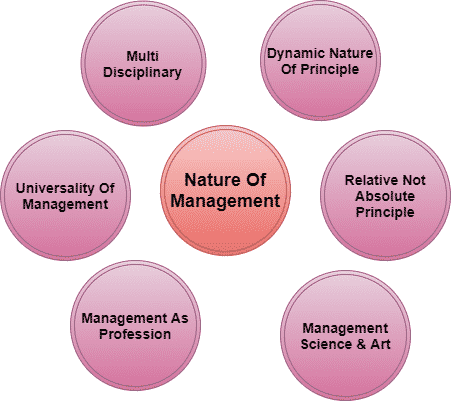What Is The 6 Nature And Concept Of Management?
Management is the process of getting people together to accomplish desired goals and objectives using available resources efficiently and effectively. The 6 Nature and Concept of Management are:
1. Planning: Planning is the process of deciding in advance what needs to be done, when it needs to be done, and who needs to do it.
2. Organizing: It is the process of arranging and allocating resources in such a way that activities can be performed to achieve the goals of the organization.
3. Staffing: It is the process of selecting, training, and developing employees for the organization.
4. Directing: It is the process of giving instructions and guidance to the employees to ensure that they perform their duties as expected.
5. Controlling: Controlling is the process of checking performance against plans and taking corrective action where necessary.
6. Coordinating: It is the process of ensuring that all activities within the organization are properly synchronized and integrated to achieve the desired goals.
Definition of Management
Management is the process of achieving organizational goals through effective planning, organizing, leading, and controlling of resources. It is an art of getting people together to accomplish desired goals and objectives efficiently and effectively. It is a combination of science and art, where science is the logical and analytical approach to problem-solving and art is the creative aspect of decision-making. Management is not only about the execution of the plans but also involves setting goals and designing strategies to attain the goals. It is a process of planning, organizing, leading, and controlling the activities of a group or organization in order to achieve the desired goals. Management involves both short-term and long-term goals that are to be achieved with the help of human and other resources. Management is an important element in all the organizations as it helps in achieving the desired results and goals in a planned and organized manner. It is the process of ensuring that the organizational goals are achieved efficiently and effectively.
History of Management
and the 6 Nature and Concept of Management
Management as a field of study has been around for centuries. Its roots can be traced back to the early days of civilizations. Ancient Egyptians, Greeks, and Romans all had methods of management in place. In the 19th century, the industrial revolution saw the emergence of large scale factories, which created a need for better management techniques. Since then, the management field has evolved and grown exponentially.
Today, management is a vital part of any successful organization and can be divided into six distinct nature and concepts. These include planning, organizing, leading, controlling, coordinating, and motivating. Planning involves setting goals and objectives and developing strategies to reach them. Organizing involves creating structures and procedures that allow the organization to achieve its goals. Leading involves creating an environment of trust and motivating employees to strive for excellence. Controlling involves monitoring progress and making adjustments to ensure that goals are met. Coordinating involves working with all personnel and departments to ensure that everyone is on the same page. Finally, motivating involves inspiring and engaging employees to reach their full potential.
These six nature and concepts of management provide an effective way of managing operations and ensuring that organizations reach their goals. By understanding and implementing these concepts, organizations can ensure their success and reach their full potential.
Management Theory and Practice
is a complex and multifaceted field of study that has evolved over centuries. The 6 Nature and Concept of Management is a widely accepted and widely-used system for organizing, planning, leading, and controlling resources in an organization. It is based on the idea that the better the organization is managed, the more successful it will be. The 6 Nature and Concept of Management includes six distinct elements: Goals, Resources, Strategies, Tactics, People, and Structure. These elements are closely linked and mutually reinforcing, and they must be managed in an integrated fashion.
Goals are the objectives that an organization sets for itself in order to achieve success. Resources refer to the personnel, materials, and financial resources that are needed to achieve those goals. Strategies are the plans used to achieve the goals, while Tactics are the specific methods used to implement the strategies. People are the employees and other stakeholders who are responsible for carrying out the strategies and tactics. Finally, Structure is the organizational structure that ensures the alignment of goals, resources, strategies, tactics, and people.
The 6 Nature and Concept of Management is a comprehensive approach to management that acknowledges the interconnectivity of all elements. It is a holistic approach that recognizes the importance of both short-term and long-term goals, and of both individual and organizational objectives. By understanding the 6 Nature and Concept of Management, organizations can create effective management systems that achieve success.

Management Roles and Responsibilities
Management is a complex process that involves a variety of roles and responsibilities. Management is responsible for planning, organizing, leading, and controlling the activities of an organization in order to achieve its goals. To effectively manage an organization, a manager must understand and be able to use the six nature and concept of management.
The six nature and concept of management are:
1. Planning: This involves setting goals and objectives, as well as determining the strategies and tactics to achieve them.
2. Organizing: This involves gathering resources and assembling them in an efficient way to accomplish the goals and objectives.
3. Leading: This involves motivating and inspiring employees to achieve maximum performance.
4. Controlling: This involves the monitoring of the progress of the organization and the use of corrective actions when necessary.
5. Coordinating: This involves the coordination of various activities and functions to ensure that they are all working together in an efficient and effective manner.
6. Delegating: This involves assigning tasks and responsibilities to others and providing them with the necessary resources to accomplish them.
By understanding and properly utilizing the six nature and concept of management, organizations can effectively achieve their goals and objectives and increase efficiency. Management is an important part of any organization and it is essential that managers understand these concepts and how to apply them in order to be successful.
Types of Management
Management is a broad concept that encompasses an array of approaches and techniques used to achieve organizational goals. At its core, it involves making decisions, organizing resources, and directing activities to achieve desired outcomes. While the concept of management is centuries old, the modern understanding of the term is often attributed to the industrial revolution. As businesses and organizations grew, the need for efficient organizational structures and processes emerged. This led to the development of six distinct types of management: Planning, Organizing, Leading, Controlling, Coordinating, and Staffing.
Planning involves setting goals, developing strategies, and creating a plan of action. It is an iterative process that involves analyzing the environment, assessing the resources available, and looking for potential solutions. Organizing involves creating structures, assigning roles, and allocating resources. Leaders set the tone and culture of the organization by inspiring and motivating their teams. Controlling involves monitoring performance and taking corrective action when needed. Coordinating involves aligning the actions of different departments and divisions to ensure that the organization is working towards a common goal. Finally, Staffing involves recruiting, training, and developing the workforce.
Each of these components plays an essential role within an organization, and they must be used in conjunction for successful management. By understanding the six nature and concept of management, business professionals can better equip themselves to lead their teams and organizations to success.
Benefits of Management
Management is an invaluable skill that can benefit individuals and organizations. It enables people to take initiative and make decisions that will help an organization operate effectively and efficiently. A manager’s role is to plan, organize, lead, and control the activities of an organization. By utilizing these skills, managers can help their organizations reach their goals and objectives. Management also provides valuable insights into organizational processes and operations, allowing managers to identify problems and develop solutions for them. Additionally, management helps to create a positive work environment, where employees can work together to achieve their goals. Overall, management is a powerful tool that can help organizations reach their potential and succeed.
FAQs About the What Is The 6 Nature And Concept Of Management?
Q1. What are the six nature and concept of management?
A1. The six nature and concepts of management are goal setting, planning, organizing, staffing, leading and controlling.
Q2. How do the six nature and concepts of management help in managing a business?
A2. The six nature and concepts of management provide a framework for managers to effectively manage their business operations. They provide guidance in setting goals, developing plans, organizing resources, recruiting staff, leading people and evaluating performance.
Q3. What is the importance of the six nature and concepts of management?
A3. The six nature and concepts of management are essential for effective business management. They provide the basis for setting objectives, developing strategies, organizing resources, recruiting personnel, leading people and controlling operations. This helps to ensure that the business is run in an efficient and effective manner.
Conclusion
In conclusion, the 6 nature and concepts of management are planning, organizing, leading, controlling, motivation and communication. Each concept is an integral part of any successful organization as it helps to ensure that the organization is running efficiently and effectively. Management is an art that requires skill and foresight in order to be successful. With proper understanding and utilization of these concepts, a manager can lead their organization to success and create a positive work environment for their employees.


